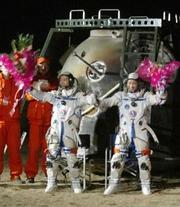
BEIJING - Two astronauts on China's second manned space flight landed before dawn Monday, shown live on state television as they emerged from their capsule smiling and waving at the end of a five-day mission meant to burnish China's global standing and rouse public support for its communist leaders.
Astronauts Fei Junlong and Nie Haisheng were "in good health" after the Shenzhou 6 capsule touched down by parachute at 4:32 a.m. local time in China's northern grasslands, just a half-mile from its target, the official Xinhua News Agency said. They were met by crews who rushed to the site in helicopters and off-road vehicles.
State television showed the astronauts climbing out of their kettle-shaped capsule with the help of two technicians and clambering down a ladder in the predawn darkness. They smiled, waved to cheering members of the ground crew, accepted bouquets of flowers and sat in a pair of metal chairs beside the capsule.
"I want to thank the people for their love and care. Thank you very much," Fei said.
Fei and Nie blasted off Wednesday from a base in China's desert northwest, almost exactly two years after the first Chinese manned space flight made this only the third country to send a human into orbit on its own, after Russia and the United States.

In contrast to this week's mission, China's first manned space mission was shrouded in secrecy, with none of it broadcast live, a decision that blunted the effort's propaganda value.
Communist leaders apparently hope the greater openness will stir patriotic pride, shoring up their standing at a time of public frustration at corruption, wrenching economic change and a growing gap between the country's rich and poor.
The country's No. 2 leader, Wu Bangguo, who watched the landing from the Beijing mission control center, declared the flight a success.
Shenzhou 6 flew 2 million miles in 115 hours and 32 minutes in space, Xinhua said. China said the five-day flight cost $110 million, and announced that it hopes to conduct a space walk in 2007.
The mission was substantially longer and more complex than the 2003 flight, when astronaut Yang Liwei orbited for 21 1/2 hours before his capsule landed by parachute.
Chinese leaders have defended the space program's expense, saying it will help to drive economic and technological development.
The government says the manned space program has cost $2.3 billion to date — a fraction of the budget of its American counterpart.
The government did not disclose the planned length of the Shenzhou 6 flight in advance or details of the astronauts' mission.
Fei and Nie will be in isolation for observation for 14 days after the mission, but family members will be allowed to visit, the Beijing Youth Daily newspaper said.
The two astronauts are both military men, former fight pilots and Communist Party members.
China has had a rocketry program since the 1950s and launched its first satellite into orbit in 1970. Its commercial aerospace agency regularly boosts satellites into orbit for foreign customers. The manned space program was inaugurated in 1992.
The Shenzhou 6 is a modified version of Russia's Soyuz capsule and China bought Russian technology for spacesuits, life-support systems and other equipment, but space officials have said all the items launched into orbit were Chinese-made.
The newspaper Beijing News said Nie and Fei would undergo 40 minutes of medical checkups after landing.
"After several days of flying in space, the astronauts may look wan and sallow, so medical staff will put makeup on them to make them look ruddy," the newspaper said.

No comments:
Post a Comment